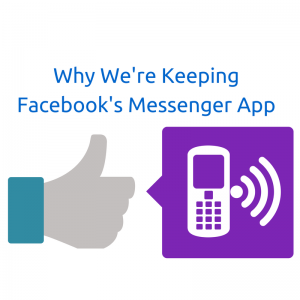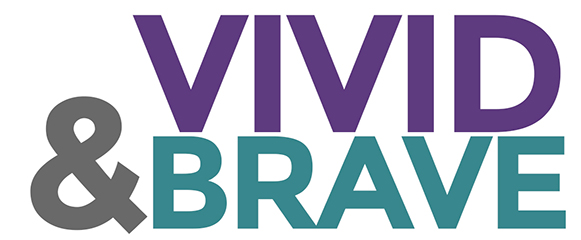 Over here at Vivid & Brave, we use Facebook’s Messenger App on a daily basis. Since Christine’s in Texas (sometimes!) and I’m in Calgary (most of the time), we use it as our primary messaging system, as well as a way to pass photos we need to upload for blog posts and save articles we want to read later. We leave messages for each other overnight, and at all hours of the day, and it keeps us running as smoothly as possible. I was happy when the app was introduced and the little chat bubbles disappeared from the main app, as well.
Over here at Vivid & Brave, we use Facebook’s Messenger App on a daily basis. Since Christine’s in Texas (sometimes!) and I’m in Calgary (most of the time), we use it as our primary messaging system, as well as a way to pass photos we need to upload for blog posts and save articles we want to read later. We leave messages for each other overnight, and at all hours of the day, and it keeps us running as smoothly as possible. I was happy when the app was introduced and the little chat bubbles disappeared from the main app, as well.
And so of course, when this article over on the Huffington Post from last December started making the rounds again, and our friends started announcing how they’d be deleting the app and only be reachable from the messenger within their browser, we both started to wonder if our ultra convenient method of communication was going to have to go.
For the most part, I’ve accepted that my participation on Facebook cannot be built on a pretense of privacy. In truth, there is very little online that we do that isn’t tracked in some way, and I’m okay with that. The things I want to be truly private I do offline. I don’t share any more than I’m comfortable having spread to a wider audience than my original intention, and I have my security settings set as tightly as possible. Basically, I don’t entirely trust the platforms I use to guarantee me privacy, and so I take the steps to protect myself – similar to locking my front door when I leave the house. I live in a safe neighbourhood and it’ll probably be fine – but I’m not going to stop taking my own steps to feel like I’ve done all I can to ensure my own security.
Facebook, unfortunately, hasn’t done much to make us want to trust them more – news of their social experiments with unknowing participants was especially disturbing – and so it’s become very easy for news outlets and bloggers that fear monger to latch onto that distrust. It’s easy to send people into a panic, and many people will in turn perpetuate half or untruths like wildfire.
Christine had deleted the app, and then resinstalled it after her husband, Mike Tremoulet, wrote a comprehensive and straightforward Facebook post on his take on the permissions controversy. Not only is he our in house chef when we all happen to be in the same city, preparing delicious brain food that fuels the creativity you find here, he’s also our trusted tech geek, having helped with everything from slide shows for our speaking engagements to a frantic two am mycomputerwontstart emergency – orchestrated via Skype.
I can’t say it better than he can, so I’ll just quote him here (with his permission):
“Looking over some things quickly, the HuffPo article Christine posted (which is what started all this for me) is from last December. Since then, FB has added photo and video sharing to Messenger (end April, source ) as well as improved voice/VOIP calling (early April, source ). This would require the app to have permission to use the phone’s camera and microphone.
The scary aspect of the original post is the way Android phrases the permissions. Note that all the permission descriptions from the HuffPo article are in fact Android’s phrasing and warnings, not Facebook’s. So, granting permission to the app to use your camera – “Allows the app to take pictures and videos with the camera. This permission allows the app to use the camera at any time without your confirmation.” – means that the app can actually use the camera at all. But once the app is given permission, it has permission. I don’t know if Android (or iOS, or Windows Phone) even allow apps to prompt the user to ask for permission every time a feature is used – all the behavior I’ve seen is that it’s only checked and granted at install.
The real question here isn’t tech. The question is whether you trust Facebook to not do something malicious while you’re using the FB Messenger app (or while it’s running in the background, I suppose). And FB is kind of iffy, at best, on the “user trust” front. Personally, I trust that they’re tracking all sorts of things about my use of Facebook, but not that they’re using my phone camera to spy on me.
I don’t know how to see about iOS permissions – I don’t remember anything so explicit, but I could easily be wrong – but Windows Phone does flag some permissions that I have to explicitly accept when I try to install an app, and lets me see what permissions an app requires:
- phone identity
- video and still capture
- location services
- maps
- music library
- photos library
- media playback
- microphone
- data services
- push notification service
- movement and directional sensor
- VOIP calling
- web browser component
I can look over all of those and see how they relate to the functions in the app.”
And there you have it. For us, this was enough to prompt us both to keep the Messenger app. I’m not writing this to try to convince you to do the same, though. I wrote this article in part to share Mike’s awesome post with a wider audience, but also, to encourage everyone to be a more critical consumer of media. Think about the things you read. Check if the source is trustworthy. Doublecheck if the information is timely. Ask for more information. And come to your own conclusions.
Stephanie Ostermann
I’m a communicator. That’s a PC way of saying I like to talk, but I also spend a lot of my time listening, and over the years, I’ve developed a sense for subtext – how one or two words can change your entire message, what people are really trying to say and how to weave the varied layers of your story into one cohesive brand message that your clients fall in love with.
When I'm not acting as editor in chief for Vivid & Brave, you can find me geeking out over words here.
Latest posts by Stephanie Ostermann (see all)
- Inventing Insecurities | No, I Don’t “Need” Eye Cream - February 24, 2017
- You Don’t Have to Be Friends With Your Ex (Or His New Wife) - November 23, 2016
- Grief & Landlines - September 20, 2016





I complained about the FB Messenger App when it first launched too, but as Baratunde R. Thurston pointed out to me back then, using it keeps you out of the vortex that is Facebook. It is fast & easy. I have gotten so used to it for that reason, I don’t want to give it up!
I don’t have any issue at all with all the “privacy” hooplah, I figure that’s a figment of our imaginations anyway (having any internet privacy), I just really hate to have to add another app. I want everything all in one app, that’s the ease of even having apps to me. Also I don’t like the way they are either do it or you’re screwed, makes me bristle up against it. Ugh. I just think it’s a butthole move on Facebooks part, doesn’t help us only helps them.
Did check out the Snopes piece on it too?
I like having the messenger portion seperate as well. I use it top talk back and forth to my mom without getting sucked into Facebook. Sometimes they may be in a place where they don’t have cell service but the camp ground may have wifi. So it’s sometimes more practical than texting for us.
Thank you for this. Well stated and such an essential read.
Tanya Malott, I had not seen it before – it is a really great read as well. http://www.snopes.com/computer/facebook/messenger.asp